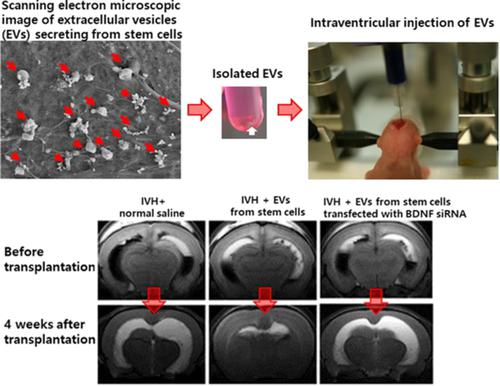当前位置:
X-MOL 学术
›
Stem Cells Transl. Med.
›
论文详情
Our official English website, www.x-mol.net, welcomes your feedback! (Note: you will need to create a separate account there.)
Brain‐derived neurotropic factor mediates neuroprotection of mesenchymal stem cell‐derived extracellular vesicles against severe intraventricular hemorrhage in newborn rats
STEM CELLS Translational Medicine ( IF 6 ) Pub Date : 2020-12-15 , DOI: 10.1002/sctm.20-0301 So Yoon Ahn 1, 2 , Dong Kyung Sung 2 , Young Eun Kim 2 , Sein Sung 1 , Yun Sil Chang 1, 2, 3 , Won Soon Park 1, 2, 3
STEM CELLS Translational Medicine ( IF 6 ) Pub Date : 2020-12-15 , DOI: 10.1002/sctm.20-0301 So Yoon Ahn 1, 2 , Dong Kyung Sung 2 , Young Eun Kim 2 , Sein Sung 1 , Yun Sil Chang 1, 2, 3 , Won Soon Park 1, 2, 3
Affiliation

|
Brain‐derived neurotropic factor (BDNF), which is secreted by mesenchymal stem cells (MSCs), protects against severe intraventricular hemorrhage (IVH)‐induced brain injuries. Although the paracrine protective effects of MSCs are mediated primarily by extracellular vesicles (EVs), the therapeutic efficacy of MSC‐derived EVs and the role of the BDNF in the EVs have not been studied. This study aimed to determine whether MSC‐derived EVs attenuate severe IVH‐induced brain injuries, and if so, whether this protection is mediated by BDNF transfer. We compared the therapeutic efficacy of MSCs, MSC‐derived EVs with or without BDNF knockdown, and fibroblast‐derived EVs in vitro in rat cortical neuronal cells challenged with thrombin and in vivo in newborn rats by injecting 200 μL of blood at postnatal day (P) 4 and transplanting 1 × 105 MSCs or 20 μg of EVs at P6. The MSCs and MSC‐derived EVs, but not the EVs derived from BDNF‐knockdown MSCs or fibroblasts, significantly attenuated in vitro thrombin‐induced neuronal cell death and in vivo severe IVH‐induced brain injuries such as increased neuronal cell death, astrogliosis, and inflammatory responses; reduced myelin basic protein and neurogenesis; led to progression of posthemorrhagic hydrocephalus; and impaired behavioral test performance. Our data indicate that MSC‐derived EVs are as effective as parental MSCs in attenuating severe IVH‐induced brain injuries, and this neuroprotection is primarily mediated by BDNF transfer via EVs.
中文翻译:

脑源性神经营养因子介导间充质干细胞源性细胞外囊泡对新生大鼠严重脑室内出血的神经保护作用
由间充质干细胞 (MSCs) 分泌的脑源性神经营养因子 (BDNF) 可防止严重的脑室内出血 (IVH) 引起的脑损伤。尽管 MSCs 的旁分泌保护作用主要由细胞外囊泡 (EVs) 介导,但尚未研究 MSCs 衍生的 EVs 的治疗效果以及 BDNF 在 EVs 中的作用。本研究旨在确定 MSC 衍生的 EV 是否能减轻 IVH 引起的严重脑损伤,如果是,这种保护是否由 BDNF 转移介导。我们在出生后一天注射 200 μL 血液,比较了 MSCs、MSC 衍生的 EVs 与或没有 BDNF 敲低和成纤维细胞衍生的 EVs 在体外用凝血酶激发的大鼠皮质神经元细胞和新生大鼠体内的治疗效果(P ) 4 和移植 1 × 10P6 时5 个MSC 或 20 μg EV。MSCs 和 MSC 衍生的 EVs,但不是来自 BDNF 敲低的 MSCs 或成纤维细胞的 EVs,显着减弱了体外凝血酶诱导的神经元细胞死亡和体内严重的 IVH 诱导的脑损伤,如增加的神经元细胞死亡、星形胶质细胞增生和炎症反应;髓鞘碱性蛋白和神经发生减少;导致出血后脑积水的进展;和受损的行为测试表现。我们的数据表明,MSC 衍生的 EV 在减轻严重的 IVH 引起的脑损伤方面与亲本 MSC 一样有效,并且这种神经保护主要是通过 EV 传递 BDNF 介导的。
更新日期:2021-02-23
中文翻译:

脑源性神经营养因子介导间充质干细胞源性细胞外囊泡对新生大鼠严重脑室内出血的神经保护作用
由间充质干细胞 (MSCs) 分泌的脑源性神经营养因子 (BDNF) 可防止严重的脑室内出血 (IVH) 引起的脑损伤。尽管 MSCs 的旁分泌保护作用主要由细胞外囊泡 (EVs) 介导,但尚未研究 MSCs 衍生的 EVs 的治疗效果以及 BDNF 在 EVs 中的作用。本研究旨在确定 MSC 衍生的 EV 是否能减轻 IVH 引起的严重脑损伤,如果是,这种保护是否由 BDNF 转移介导。我们在出生后一天注射 200 μL 血液,比较了 MSCs、MSC 衍生的 EVs 与或没有 BDNF 敲低和成纤维细胞衍生的 EVs 在体外用凝血酶激发的大鼠皮质神经元细胞和新生大鼠体内的治疗效果(P ) 4 和移植 1 × 10P6 时5 个MSC 或 20 μg EV。MSCs 和 MSC 衍生的 EVs,但不是来自 BDNF 敲低的 MSCs 或成纤维细胞的 EVs,显着减弱了体外凝血酶诱导的神经元细胞死亡和体内严重的 IVH 诱导的脑损伤,如增加的神经元细胞死亡、星形胶质细胞增生和炎症反应;髓鞘碱性蛋白和神经发生减少;导致出血后脑积水的进展;和受损的行为测试表现。我们的数据表明,MSC 衍生的 EV 在减轻严重的 IVH 引起的脑损伤方面与亲本 MSC 一样有效,并且这种神经保护主要是通过 EV 传递 BDNF 介导的。

























 京公网安备 11010802027423号
京公网安备 11010802027423号